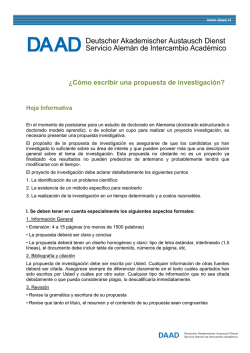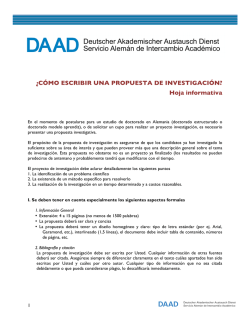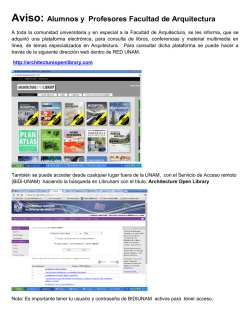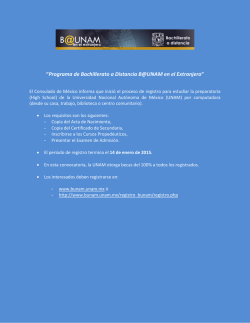
Sixth International DAAD Alumni Seminar: Green Engineering
SIXTH INTERNATIONAL DAAD ALUMNI SEMINAR: Green Engineering In Honor of Dr. Peter Kuschk Junio / June 05, 2015 FINAL REPORT INFORME FINAL The German Academic Exchange Service, DAAD (in German), has granted financial and logistic support to organize Alumni events in important subjects to promote the interaction of the academic and industrial world with the society. El Servicio Alemán de Intercambio Académico, DAAD (en alemán), ha apoyado financiera y logísticamente la realización de seminarios de ex-alumnos en temas muy importantes para promover la interacción del mundo académico e industrial con la sociedad. With the active participation of 24 Alumni, 11 especially invited people, including some doctorate students, totaling 53 registered attendants. The opening ceremony was presided by Mrs. Susanne Faber, representing the Director of the DAAD Office for Mexico and Central America, Dr. Alexander Au, and by Prof. Jorge Manuel VázquezRamos, Ph.D., Director of the UNAM Faculty of Chemistry, the host institution for this Seminar. Con la participación activa de 24 alumni, 11 invitados especiales, incluyendo a algunos estudiantes de doctorado totalizando 53 participantes registrados. La ceremonia de inauguración fue presidida por la Sra. Susanne, en representación del Dr. Alexander Au, Director de la Oficina del DAAD para México y Centro América y por el Prof. Dr. Jorge Manuel VázquezRamos, Director de la Facultad de Química de la UNAM, como entidad anfitriona. The activities were focused to Green Engineering, as the first, second, third, fourth, and fifth versions of the Seminar carried out in March 2010, April 2011, April 2012, April 2013, June 2014 and June 2015. As Dr. Peter Kuschk, from the UfZ-Leipzig Halle, passed away last October 2014, it was unanimously decided that starting this Seminar the name would include “in Honor of Dr. Peter Kuschk”, who was the honor opening key note speaker of four of the five seminars. One of his coworkers, Dr. Uwe Kappelmeyer, delivered this year seminar opening conference. Las actividades, como en la primera, segunda, tercera, cuarta y quinta versión de los realizados en marzo de 2010, en abril de 2011 y 2012 y en junio de 2014 y 2015, se refirieron a la Ingeniería Verde. Como el Dr. Peter Kuschk, del Centro de Estudios Ambientales de Leipzig-Halle, falleció el pasado mes de octubre de 2014, se decidió unánimemente que a partir de este Seminario se incluyera en el nombre “en Honor al Dr. Peter Kuschk”, quien fuera el conferencista magistral de cuatro de los cinco seminarios previos. Uno de sus colaboradores, el Dr. Uwe Kappelmeyer, impartió la conferencia magistral de apertura del seminario. The First Round Table was chaired by Mrs. Dr. Carolina Peña-Montes, a DAAD Alumna, who belongs to the Department of Food Science and Biotechnology of the Faculty of Chemistry of the UNAM. La Primera Mesa Redonda fue moderada por la Dra. Carolina Peña-Montes, Alumna del DAAD, quien pertenece al Departamento de Alimentos y Biotecnología de la Facultad de Química de la Universidad Nacional Autónoma de México. The first speaker was one of the invited researchers, a graduate student from the UNAM Program for Masters and Doctorate Studies on Engineering (PMyDI in Spanish), Mr. Cand. Dr. in Eng. Leonel El primer conferencista fue uno de los doctorantes del Programa de Maestría y Doctorado en Ingeniería de la UNAM, PMyDI, el Cand. Dr. en Ing. Leonel Ernesto Amábilis-Sosa. Él presentó la conferencia intitulada 1 Ernesto Amábilis-Sosa. He presented the conference Environmental fate of lead and chromium in artificial wetlands inoculated with metal tolerant strains. Destinos ambientales de plomo y cromo en humedales artificiales inoculados con cepas tolerantes a metales. The second speaker was Ms. Cand. Dr. in Eng. María Guadalupe Salinas-Juárez, also from the UNAM PMyDI, presenting the conference Comparison of two packing materials for an artificial wetlands system electrochemically assisted. La segundo conferencista fue la Cand. Dra. en Ing. María Guadalupe Salinas-Juárez, también del PMyDI de la UNAM, presentando la conferencia Comparación de dos medios de empaque para un humedal artificial asistido electroquímicamente. The third speaker was an invited professor of the Universidad Tecnológica de Izúcar de Matamoros, in Puebla, Mexico, Prof. Dr. Amado Enrique Navarro-Frómeta. His conference was entitled Removal of low molecular weight organic microcontaminants in hybrid constructed wetlands. The fourth speaker was a recently graduate professional from the Instituto Tecnológico de Puebla, in Puebla, Mexico, Dipl.-Ing. Óscar Secundino-Sánchez, M.S. in Eng. He presented the following theme: Academic support to rural communities: Subsuperficial horizontal flow artificial wetlands for the treatment of Santa Maria Coatepec El Seco, Puebla, Mexico’s wastewaters. El tercer conferencista fue el professor invitado de la Universidad Tecnológica de Izúcar de Matamoros, en Puebla, México, el Prof. Dr. Amado Enrique NavarroFrómeta. Su conferencia se intituló Remoción de microcontaminantes orgánicos de baja masa molecular en humedales construidos híbridos. The Second Round Table was going to be moderated by Dr. Felipe Lara-Rosano, DAAD Alumnus and former director of the UNAM’s Center for Applied Sciences and Technological Research. Unfortunately, he had a personal problem and had to be substituted by Mrs. Prof. Dr.-Ing. María del Carmen Durán-Domínguez-de-Bazúa, from the Chemical Engineering Department, of the Facultad de Química, UNAM (National Autonomous University of Mexico), DAAD Alumna. La Segunda Mesa Redonda iba a ser moderada por el Prof. Dr. Felipe Lara-Rosano, DAAD Alumnus y exDirector del Centro de Ciencias Aplicadas y Desarrollo Tecnológico de la UNAM, pero por motivos personales no pudo hacerlo y fue sustituído por la Profa. Dr.-Ing. María del Carmen Durán Domínguez de Bazúa, del Departamento de Ingeniería Química de la Facultad de Química de la Universidad Nacional Autónoma de México y DAAD Alumna. The first conference dealt with Water, a crisis is coming and was delivered by Prof. Dr. Gabriel Echávez, DAAD Alumnus from the Faculty of Engineering, UNAM. La tercera conferencia versó sobre el Agua, La crisis que viene y estuvo a cargo del Prof. Dr. Gabriel Echávez, DAAD Alumnus de la Facultad de Ingeniería de la UNAM. The second speaker was Mrs. Dr. María del Refugio González-Sandoval, DAAD Alumna, from La segunda conferencista fue la Dra. María del Refugio González-Sandoval, DAAD Alumna, de la Universidad El cuarto conferencista fue un profesionista recientemente graduado del Instituto Tecnológico de Puebla, en Puebla, México, el M. en Ing. e Ing. Óscar Secundino-Sánchez. Él presentó la conferencia Apoyo académico a comunidades rurales: Humedal artificial subsuperficial de flujo horizontal para el tratamiento de agua residual en Santa María Coatepec, El Seco, Puebla, México. 2 the Autonomous University of the State of Hidalgo, and her talk was entitled Water and wind erosion of “jales” in Pachuca, Hidalgo, Mexico, that was an interesting approach to green engineering. Autónoma del Estado de Hidalgo. Su plática se intituló Erosión hídrica y eólica de jales en Pachuca, Hidalgo, México, con un interesante enfoque hacia la ingeniería verde. Dr. Alessandro Carmona, from the INRA National Institute for the Agronomic Research from France was the thrid speaker. He is also a DAAD Alumnus. His very interesting conference dealt with the Study of electron transfer mechanisms and production of added value molecules by microbial electrochemistry technologies. Mrs. Prof. Dr. Georgina Fernández, from the UNAM, Faculty of Engineering, and DAAD Alumna, was the Chairperson for the Third Round Table of Experts. El Dr. Alessandro Carmona, del INRA, Instituto Nacional para la Investigación Agronómica, de Francia y quien también es DAAD Alumnus, presentó una conferencia muy interesante intitulada: Estudios sobre los mecanismos de transferencia de electrons y la producción de moléculas de alto valor agregado empleando tecnologías de electroquímica microbiana. La Profa. Dra. Georgina Fernández-Villagómez, de la Facultad de Ingeniería de la UNAM, y DAAD Alumna, fue la moderadora de la Tercera Mesa Redonda de Expertos. The first speaker was Mrs. Prof. Dr.-Ing. María del Carmen Durán-Domínguez, DAAD Alumna of the Facultad de Química, UNAM, whose conference on Green engineering and food and non alcoholic drinks? A relevant issue opened some interesting discussion with the audience. La primera conferencista fue la Profa. Dr.-Ing. María del Carmen Durán-Domínguez, DAAD Alumna de la Facultad de Química de la UNAM, cuya conferencia despertó inquietudes y discusión entre el auditorio: ¿Ingeniería verde y etiquetado de alimentos y bebidas no alcohólicas? Un asunto relevante. The second conference on From photosynthesis to electric energy production was delivered by Dr. Antonio Esteban Jiménez-González, from UNAM, Institute for Renewable Energies, in Temixco, Morelos, Mexico. He is also a DAAD Alumnus. La segunda conferencia, De la fotosíntesis a la generación de potencia eléctrica, fue presentada por el Dr. Antonio Esteban Jiménez-González, de la UNAM, del Instituto de Energías Renovables en Temixco, Morelos, México. Él también es Alumnus DAAD. The last conference of this Round Table was presented by Mr. Cand. Dr. in Eng. José Manuel Barrera-Andrade, from the UNAM Graduate Program in Engineering. His topic was Degradation of textile dye BR69 using mesoporous catalyst. As the previous conferences dealt also with this subject the discussion was very interesting and enriching. La última conferencia de esta Mesa Redonda fue presentada por el Cand. Dr. en Ing. José Manuel Barrera-Andrade del Programa de Maestría y Doctorado en Ingeniería de la UNAM. Su tópico fue la Degradación de un colorante textil AR69 empleando un catalizador mesoporoso. Como algunas de las conferencias anteriores también trataron esta temática la discusión fue muy interesante y enriquecedora. Within the Fourth Round Table, chaired by Dra. María del Refugio González-Sandoval, from the Autonomous University of the State of Hidalgo, Mexico, and DAAD Alumna, the first speaker was Dr. Simón González-Martínez, DAAD Alumnus, from the UNAM Institute of Engineering, and his conference was Biogas production from municipal En la Cuarta Mesa Redonda, la Dra. en Ing. María del Refugio González-Sandoval, de la Universidad Autónoma del Estado de Hidalgo y DAAD Alumna, fue la moderadora. El primer conferencista fue el Dr. Simón González-Martínez, DAAD Alumnus, del Instituto de Ingeniería de la UNAM, quien dió la conferencia Producción de biogás a partir de residuos sólidos 3 solid refuse. This interesting approach was amply discussed later on in the questions and answers session. orgánicos urbanos. Este interesante acercamiento fue ampliamente discutido en la sesión de participación posterior. The second participation corresponded to Prof. Dr. José Eduardo Rodríguez-Bustamante of the Facultad de Ciencias, UNAM, who presently is a Visiting Professor of the Instituto de Química, UNAM, and who is also a DAAD Alumnus, and was focused to Use of an agroindustrial residue, obtained from spent coffee grounds, for the fungal production of hydrolytic enzymes. This presentation was also a theme of many comments among participants. En la segunda participación, el Prof. Dr. José Eduardo Rodríguez-Bustamante de la Facultad de Ciencias de la UNAM, quien está como Profesor Visitante en el Instituto de Química de la UNAM y quien también es DAAD Alumnus se refirió al Uso de un residuo agroindustrial, obtenido del bagazo de la extracción de café, para la producción fúngica de enzimas hidrolíticas. Esta presentación también dio pie a una buena discusión entre los participantes. The third participation correspondend to a visiting scholar from the McGill University in Montréal, Canada, Alexander Grant. His conference was entitled Photoelectrodes for the treatment of organic wastewaters. La tercera participación correspondió a un colega invitado de la Universidad McGill de Montreal, Canadá, Alexander Grant. Su conferencia se intituló Fotoelectrodos para el tratamiento de aguas residuales orgánicas. The Closing Key Note Conference was delivered by Prof. Dr. Enrique Rodolfo Bazúa-Rueda, exDirector of the UNAM Faculty of Chemistry and Fellow of the Alexander von Humboldt Stiftung in the University of Heidelberg, at its Institute of Physical Chemistry. The subject, quite ad hoc for this Seminar, was on Renewable energies in Mexico giving interesting data on renewable energy sources in Europe and its possible applications for Mexico. La conferencia magistral de clausura fue impartida por el Prof. Dr. Enrique Rodolfo Bazúa-Rueda, ex-Director de la Facultad de Química de la UNAM y recipiendario de la beca de la Fundación Alexander von Humboldt en la Universidad de Heidelberg, en el Instituto de Fisicoquímica. Su tema, muy ad hoc para este seminario, fue sobre Las energías renovables en México dando datos muy interesantes sobre las fuentes de energías renovables en Europa y sus posibilidades de aplicación para México. The closing ceremony was presided by the organizer, Mrs. Prof. Dr.-Ing. María del Carmen Durán-de-Bazúa since, in the morning after the opening key note conference, a personal apology through his honorable presence, was delivered by Mr. Bernd Wieblich, Scientific Attaché from the German Embassy in Mexico City. He informed the audience, that he had a personal responsibility representing the Ambassador of Germany in Mexico. He wished all the best to the Seminar participants. La ceremonia de clausura fue presidida por la organizadora, la Profa. Dr.-Ing. María del Carmen Durán-de-Bazúa, dado que por la mañana, después de la conferencia magistral inaugural, el Sr. Bernd Weiblich, Agregado Científico de la Embajada de Alemania en la Ciudad de México personalmente se disculpó. Él informó a los asistentes que tenía un compromiso representando al Embajador de Alemanía en México y aprovechó la oportunidad para desear a todos los participantes del Seminario lo mejor en este evento académico. 4
© Copyright 2026



